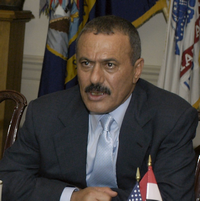U.S. and European efforts to stabilize Yemen and Somalia are boomeranging. Rather than weakening militants in both countries, Western counterterrorism and counterinsurgency strategies are fueling radicalism and turning wide swathes of the population against the West.
With little real effort to economically and politically stabilize the two countries, U.S. military and security support for Yemeni President Ali Abdullah Saleh and the embattled head of Somalia's Transitional Federal Government (TFG), Abdullahi Yusuf Ahmed, exacerbates local fault lines and strengthens deep-seated anti-Americanism.
The backfiring of Western policies is compounded by a one-size-fits-all approach and a failure to address local grievances. To be sure, the Saleh and Ahmed governments are as much a part of the problem as they are part of the solution. This, and differences between the goals of Western nations and those of their regional allies, complicates efforts to embed security and military policy within initiatives to improve the population's economic lot and enhance good governance. Nonetheless, the incentive to get the policy right is compelling: Together Yemen and Somalia control key oil-export routes through the Gulf of Aden; mounting instability in both countries threatens regional stability in the oil-rich gulf and surrounding resource-rich African nations.

